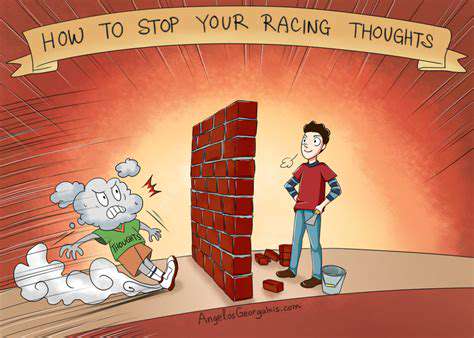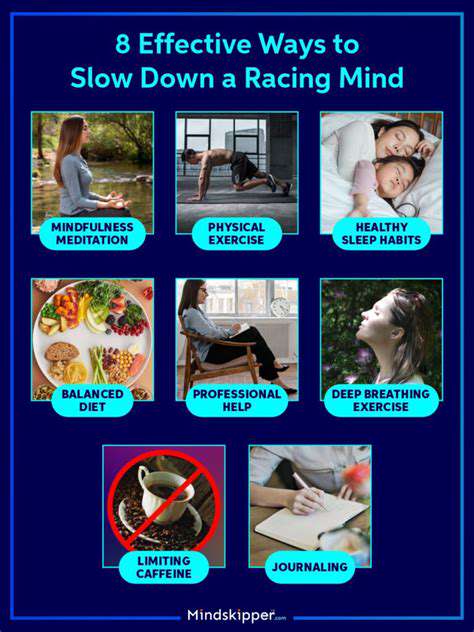How to Cope with Racing Thoughts: Effective Strategies to Find Calm
What Are Racing Thoughts?

Definition and Symptoms of Racing Thoughts
Racing thoughts refer to a rapid flow of ideas, concepts, and visuals that flood the mind, often leading to confusion and overwhelm. These thoughts can make it difficult to focus, complete tasks, or engage in conversations. Individuals experiencing racing thoughts may feel as if their mind is out of control.
Common symptoms can include a rapid heartbeat, fidgeting, and difficulty sleeping. Recognizing these symptoms is crucial for seeking appropriate strategies to manage the racing mind.
Causes of Racing Thoughts
Racing thoughts can stem from a variety of factors, including anxiety, stress, and even certain mental health disorders. Environmental triggers and personal circumstances can also play significant roles in the onset of these racing thoughts.
Additionally, lifestyle choices such as lack of sleep, excessive caffeine intake, or substance use can exacerbate the intensity of racing thoughts. Understanding the root causes is an essential step towards finding effective coping mechanisms.
Common Triggers of Racing Thoughts
1. Stress and Anxiety
One of the most common triggers of racing thoughts is stress and anxiety. When faced with overwhelming responsibilities or challenges, the mind can become flooded with thoughts about what needs to be done. This can lead to a cycle of worry and mental clutter.
During stressful times, individuals may find themselves constantly ruminating on worst-case scenarios, causing an increase in anxiety levels. Acknowledging that stress can ignite racing thoughts is the first step in managing this response.
Developing effective coping strategies can help mitigate the impact of stress on racing thoughts. Mindfulness practices, such as deep breathing or meditation, allow individuals to ground themselves and break the cycle of anxiety-driven thoughts.
Additionally, addressing the root causes of stress—such as time management, lifestyle choices, and self-care—can reduce the prevalence of racing thoughts. Taking proactive steps to reduce stress can lead to greater mental clarity.
Lastly, seeking professional help through counseling or therapy can provide personalized strategies to cope with anxiety, helping individuals to regain control of their thought patterns.
2. Sleep Deprivation
Lack of sleep is another significant factor that can trigger racing thoughts. When the body and mind do not receive adequate rest, cognitive functions can suffer, leading to difficulties in concentrating and processing thoughts.
Sleep deprivation can make it challenging to manage emotions effectively, often resulting in heightened anxiety and an inability to cope with everyday stressors. This can lead to a cascade of racing thoughts at night, making it nearly impossible to fall asleep.
Establishing a consistent sleep routine can be beneficial in combating the effects of sleep deprivation. Creating a relaxing bedtime ritual, such as reading or light stretching, can signal to the brain that it is time to wind down.
Additionally, limiting exposure to screens before bed and maintaining a dark, quiet sleep environment can enhance sleep quality. Healthy sleep habits not only improve mood and focus but also contribute significantly to reducing racing thoughts.
Finally, if sleep issues persist, consulting a healthcare professional could provide insights into underlying conditions or offer treatment options to help improve sleep and overall mental health.
3. Hyperstimulation from Surroundings
In our modern world, hyperstimulation from external stimuli can be a significant trigger for racing thoughts. Constant exposure to technology, noise, and visual distractions can overload the brain, making it difficult to focus.
For many individuals, being in chaotic environments or engaging in sensory overload activities can lead to a barrage of thoughts that race through their minds. This can cause feelings of overwhelm and an inability to concentrate on any one task.
To combat hyperstimulation, it is essential to create a calm and organized environment. Reducing clutter in personal spaces and minimizing distractions during work or relaxation times can help slow down racing thoughts.
Incorporating regular breaks from technology and social media can also help individuals better regulate their thought patterns. Spending time in nature or engaging in quiet activities such as reading or journaling can provide a much-needed mental reset.
Practicing mindfulness or grounding techniques can further assist in navigating through feelings of hyperstimulation. By focusing on the present moment and engaging with one’s surroundings thoughtfully, individuals can cultivate a sense of calm amidst the chaos.
Effective Strategies to Manage Racing Thoughts

Understanding the Triggers of Racing Thoughts
Racing thoughts can often be linked to specific triggers that can escalate anxiety and stress. Identifying these triggers is crucial for developing coping strategies. Common triggers may include stressful life events, lack of sleep, or even consuming too much caffeine. By keeping a journal, you can track when these thoughts occur and what might have influenced their onset. This awareness can empower you to mitigate their impact.
Additionally, certain mental health conditions, such as anxiety disorders or ADHD, can exacerbate racing thoughts. If you suspect an underlying issue, consider seeking professional guidance. A therapist can provide tailored coping mechanisms suited to your needs.
Understanding the emotional state associated with these racing thoughts is also important. Many individuals may experience feelings of fear or overwhelm during these episodes. Thus, recognizing the emotional responses can help you address them more effectively.
Once you know your triggers, you can work on avoiding or managing them. For instance, if caffeine is a frequent culprit, try reducing your intake and opting for calming herbal teas instead. This can lead to a significant decrease in racing thoughts.
Lastly, remember that the journey to understanding your triggers is a gradual process. Be patient with yourself and acknowledge small victories along the way. Each step towards understanding can significantly contribute to your overall mental well-being.
Practical Techniques to Calm Racing Thoughts
One effective technique for managing racing thoughts is mindfulness meditation. This practice encourages you to focus on the present moment and observe your thoughts without judgment. Over time, you may find it easier to create distance between yourself and your racing thoughts, leading to a calmer state of mind.
Another useful strategy is deep breathing exercises. By concentrating on your breath, you can help slow down your racing thoughts and bring your focus back to your body. Simply inhaling deeply through your nose and exhaling slowly through your mouth can create a sense of tranquility.
Engaging in physical activity is also beneficial. Exercise releases endorphins, which are natural mood lifters. Whether it's a brisk walk or an intense workout, physical movement can serve as an effective outlet for pent-up energy, helping to clear your mind.
Additionally, establishing a consistent sleep schedule can significantly impact the frequency of racing thoughts. Lack of adequate rest often fosters heightened anxiety, which can lead to racing thoughts. Make it a goal to wind down each night and prioritize a good night's sleep.
Finally, consider creative outlets like journaling, drawing, or even singing. Channeling your thoughts into a different medium can provide relief and act as a constructive diversion. Finding what resonates with you can be a transformative step in regaining control over your thoughts.
When to Seek Professional Help

Understanding the Nature of Racing Thoughts
Racing thoughts are often characterized by a rapid flow of ideas and feelings that can become overwhelming. They can be triggered by various factors, including anxiety, stress, or even excitement. Recognizing the root cause of these thoughts is crucial for effective management. Commonly, individuals may experience racing thoughts during periods of high stress or when faced with important decisions.
Furthermore, racing thoughts can disrupt daily functioning, affecting sleep patterns and overall well-being. This mental chaos can lead to feelings of frustration and helplessness. Understanding that you are not alone in experiencing this symptom can be comforting.
In some cases, racing thoughts may be linked to underlying mental health conditions, such as ADHD or bipolar disorder. It's important to differentiate between occasional racing thoughts and those that severely impact your quality of life. Seeking clarity can help in discussing symptoms with a healthcare provider.
Ultimately, identifying triggers and patterns can aid in developing personalized coping strategies. Keeping a journal to track when these thoughts occur might provide deeper insights into their nature.
Practical Techniques to Manage Racing Thoughts
There are several effective techniques that individuals can use to manage racing thoughts. One popular method is mindfulness meditation, which encourages present-moment awareness and calmness. By focusing on your breath and observing your thoughts without judgment, you can create space between yourself and the chaos in your mind.
Another strategy is cognitive restructuring, where you challenge and reframe negative thoughts. This can help to reduce the power racing thoughts have over your emotional state. Understanding that thoughts are not facts can be liberating and reduce anxiety.
Physical exercise also plays a crucial role in managing racing thoughts. Engaging in regular physical activity can not only reduce stress levels but also promote better sleep, which is often disrupted by racing thoughts. Simple activities like walking or yoga can be particularly beneficial.
Lastly, implementing a structured routine can help in minimizing the occurrence of racing thoughts, providing a sense of predictability and control in your day. Planning your day ahead and sticking to a schedule can lead to greater peace of mind.
Utilizing Relaxation Techniques
Relaxation techniques can be highly effective in calming racing thoughts. Deep breathing exercises are a great starting point; they help center your mind and decrease anxiety levels. Focusing on slow, controlled breaths can bring you back to the present moment.
Progressive muscle relaxation is another valuable method. Tensing and then relaxing different muscle groups in the body helps to release physical tension that often accompanies racing thoughts. By focusing on your body, you can divert your attention from overwhelming thoughts.
Visualization techniques can also be powerful, allowing your mind to focus on peaceful images or scenarios. This practice can create a mental escape from racing thoughts, promoting feelings of serenity. A tranquil beach or a quiet forest might evoke a sense of calm and grounding.
Lastly, listening to calming music or nature sounds can create an environment conducive to relaxation. Soundscapes can distract the mind and reduce the intensity of racing thoughts, offering a comforting auditory experience.
Healthy Lifestyle Choices to Support Mental Clarity
Maintaining a balanced diet can significantly enhance mental clarity and reduce racing thoughts. Foods rich in Omega-3 fatty acids, whole grains, and leafy greens contribute to brain health. What you eat has a direct impact on your mood and cognitive function.
Staying hydrated is equally important, as dehydration can affect concentration and overall cognitive function. Making sure to drink enough water throughout the day can help maintain mental acuity and reduce stress levels.
Additionally, getting adequate sleep is essential for reducing the occurrence of racing thoughts. Establishing a regular sleep schedule and creating a calming bedtime routine can have profound effects on mental clarity. Prioritizing rest is one of the best investments in your mental health.
Finally, engaging in hobbies and leisure activities that bring you joy can mitigate stress and provide a healthy outlet for your thoughts. Creativity can serve as a powerful tool to process emotions and find calm amidst chaos.
When to Seek Professional Help
Recognizing when to seek professional help for racing thoughts is important. If racing thoughts interfere with your daily life or persist despite employing coping techniques, it may be time to consult a mental health professional. They can provide tailored strategies and support.
Professional intervention is especially crucial if your racing thoughts are accompanied by other symptoms such as depression, severe anxiety, or suicidal thoughts. Being proactive about your mental health can prevent escalation and lead to better outcomes.
Medication may also be an option for some individuals, depending on the severity and underlying causes of racing thoughts. A healthcare provider can help determine if this route is appropriate for your situation. Open communication with professionals is key to finding the right path to peace.